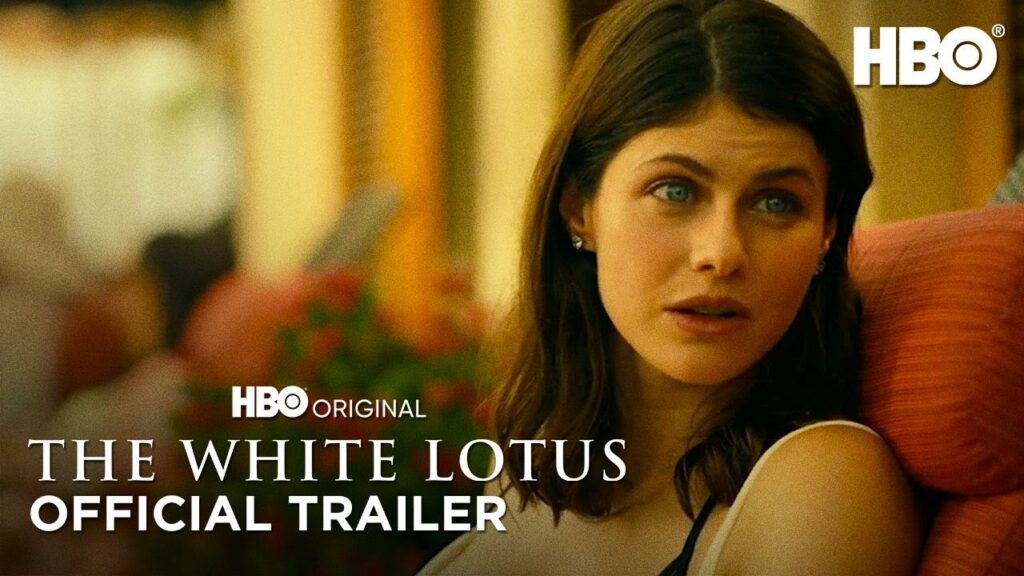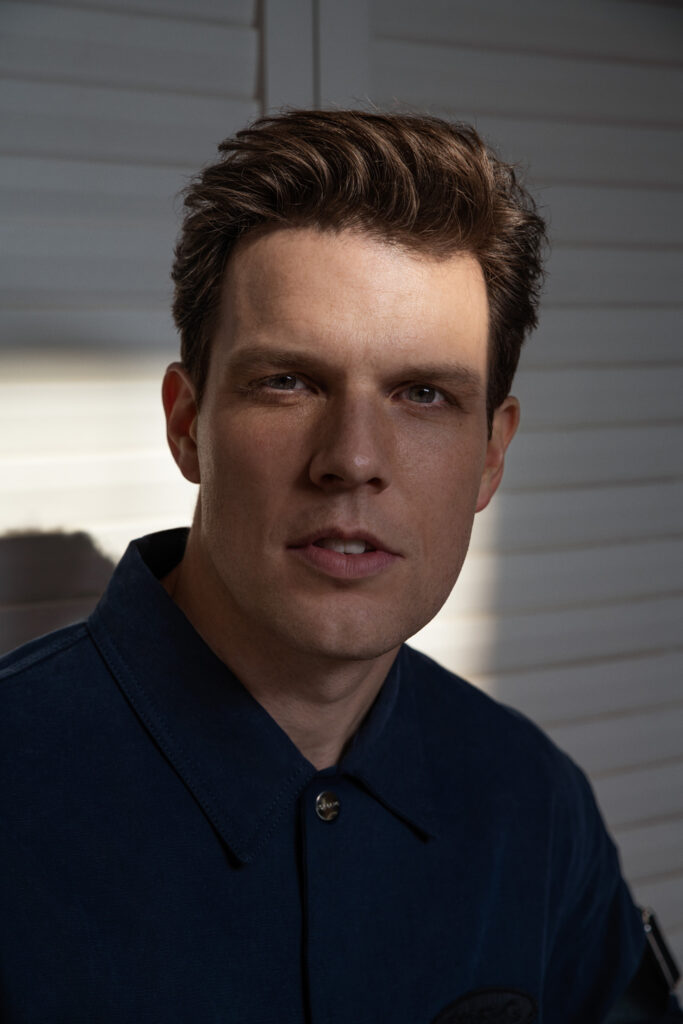
JAKE LACY
in HBO series
THE WHITE LOTUS
Photography Dylan Coulter
Fashion Editor Deborah Ferguson
Interview by Tessa Swantek
Jake Lacy, American actor, is often dubbed the “nice guy” in many of his previous roles, however in The White Lotus by HBO Max, Lacy plays the guy who thinks he’s the nice guy.
Written, directed, and produced by Mike White, The White Lotus is a social satire as a humorous ensemble cast portrays Hawaiian resort guests whose comments on colonialism, masculinity, and wealth act as a cipher hidden beneath tropical music and palm trees. Lacy’s character, Shane, is newly wed to Rachel (Alexandra Daddario) as they embark on an idyllic honeymoon vacation. A hotel room mishap throws Shane into an unrelenting “I want to speak to the manager quest” and his comedic attitude of being “unequivocally in the right,” as Lacy describes, reflects the tone of the six-episode series. Lacy candidly tells us about his experience as an actor, briefs us on what’s next for him, shares stories about working on The White Lotus, and uses self-deprecating humor and self-awareness in a way that Shane never would.
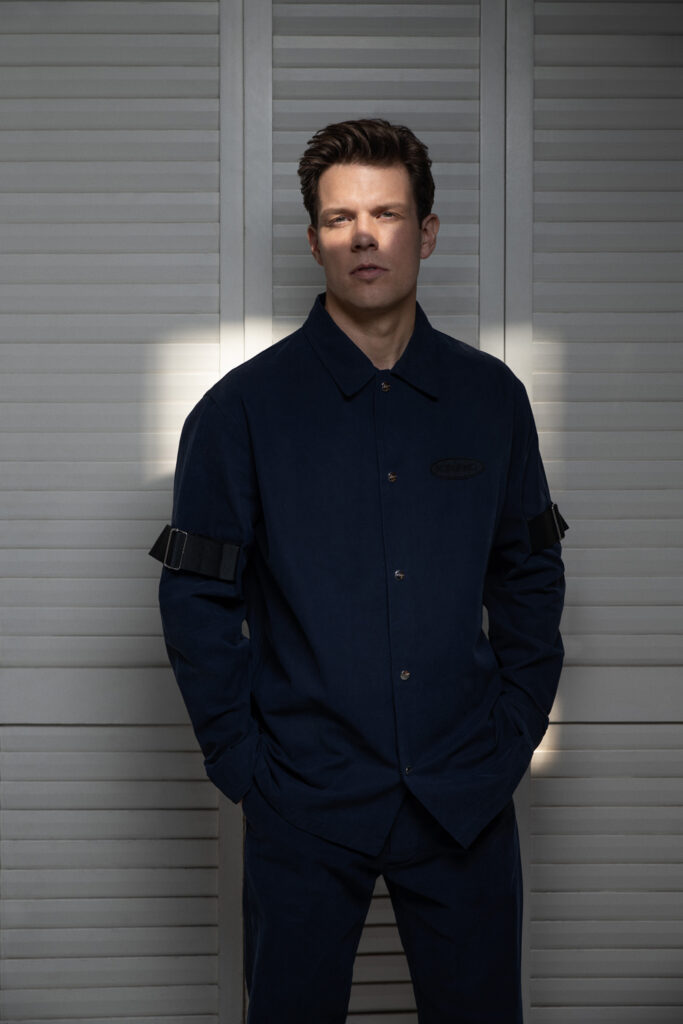
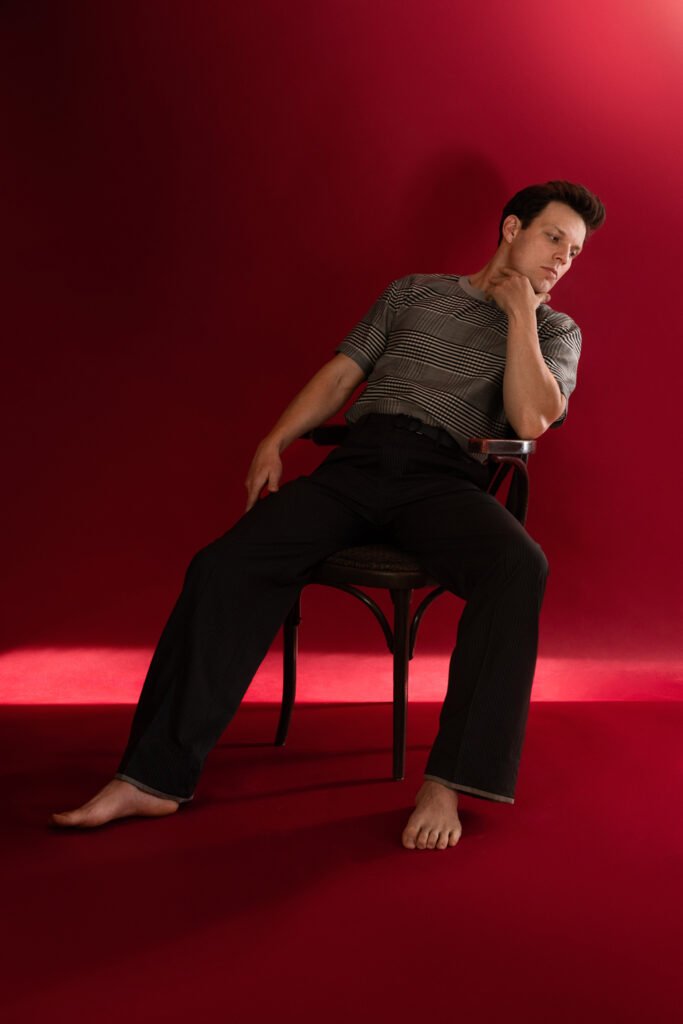
Top: Christian Wijnants, Pants: Salvatore Ferragamo
You have worked in both films from Ode to Joy, Diane, Miss Sloane, and Carol to TV series Girls, I’m Dying Up Here, High Fidelity, and most recently The White Lotus. It has been said that the delineation between film and TV has been shrinking, would you say the same?
I started in this business at the tail end of the era in which there was a divide between “film actors” and “tv actors.” The implication being that films, and the stories and actors in that world, deserved to be taken seriously and TV was essentially entertainment and fluff. The reality is that film budgets have either ballooned or nearly disappeared. There are either tent-pole films being made for hundreds of millions of dollars or indies being made for 1 or 2 million. The $30 million comedy or the $20 million kitchen sink drama is all but extinct and those projects have found a new home in television as either a limited series or an episodic with 6 to 10 episodes each season. I think creative freedom is really dependent upon who is producing the project more than whether it’s a film or a series. With The White Lotus, HBO had reached out to Mike [White] to ask if he could write something that could be shot given the difficulties of filming during a pandemic. That basically meant a limited cast in a single location. My understanding, however, is from there on out they were pretty hands off. I think often when the budget starts to get really big or there are a dozen different producers involved, the difficulty is less about creative freedom and more about creative focus. Maybe those are the same thing, but when there are so many people with different opinions and agendas, priorities can start to get murky and you wind up with kind of a mess by the end. On this one we were so lucky to have Mike leading the way. It also helps that no one in the cast was a douche bag.
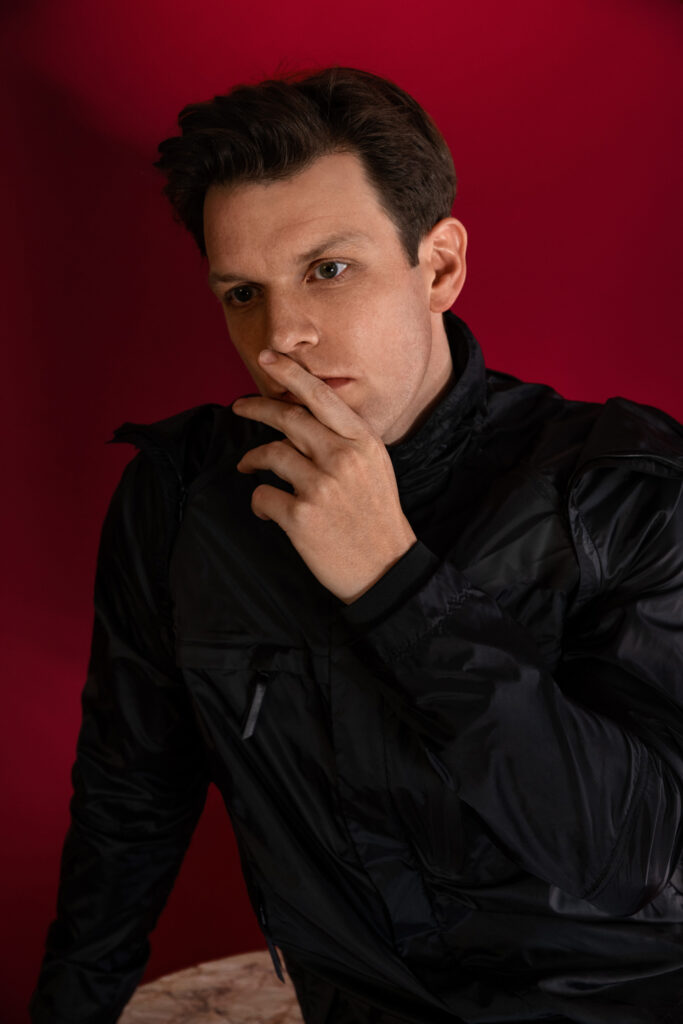
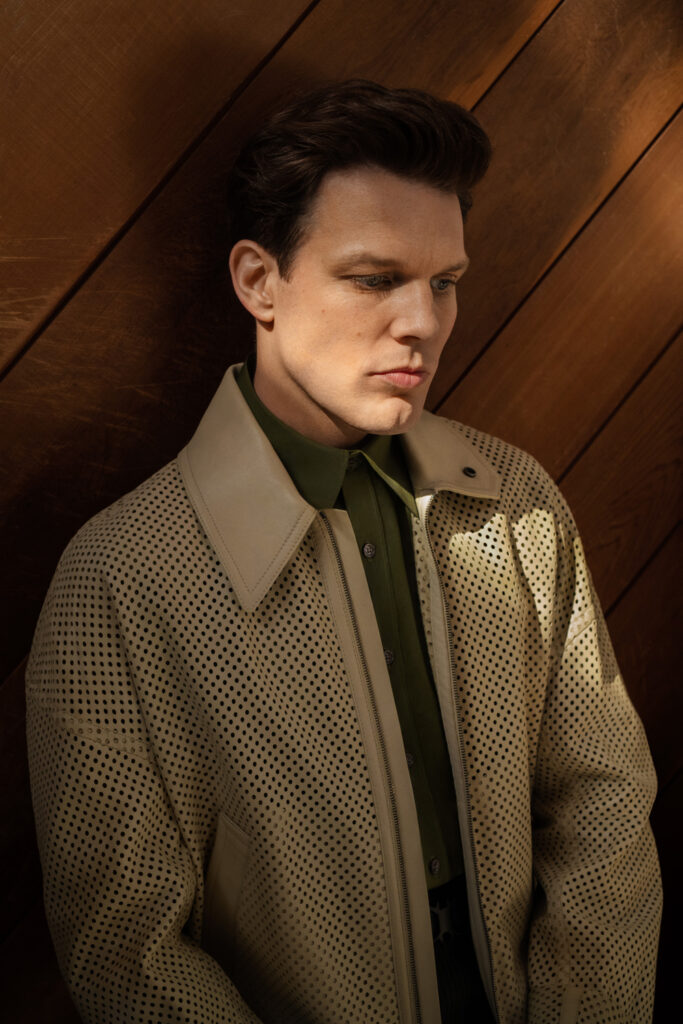
Jacket, Shirt, Belt and Pants: Salvatore Ferragamo
You mentioned that the TV industry seems to also be experiencing a shift to shorter series that are, more or less, around 10 episodes especially on streaming platforms. How does this shift affect your character portrayal and preparation?
I think I probably put in a similar amount of work for each project. That said, the work I would do for Girls, if it were filmed today, would be totally different from what I prioritized 7 or 8 years ago. The same goes for Fosse/Verdon even though that was only a few years back. I find it easier to work on something if I have more to do in the story. Maybe I’m just making excuses and I should be able to bring the same quality to every role no matter what amount of screen time I have, but I’m just not that good!
What personality traits do you feel contribute to your success in the entertainment industry? You are now a husband and a father; are these personal changes reflected in your professional career?
I have been very, very lucky. That sounds like some humble actor bullshit. In my opinion, any amount of success in this business is built on a massive amount of luck. As for fatherhood, I’d like to think it has made me a better person but I’m not sure that’s really true. I know it’s made me more myself, for better or worse. That just means I have a clearer sense of who I am and what I care about. Ultimately that finds its way into my work somehow- hopefully.
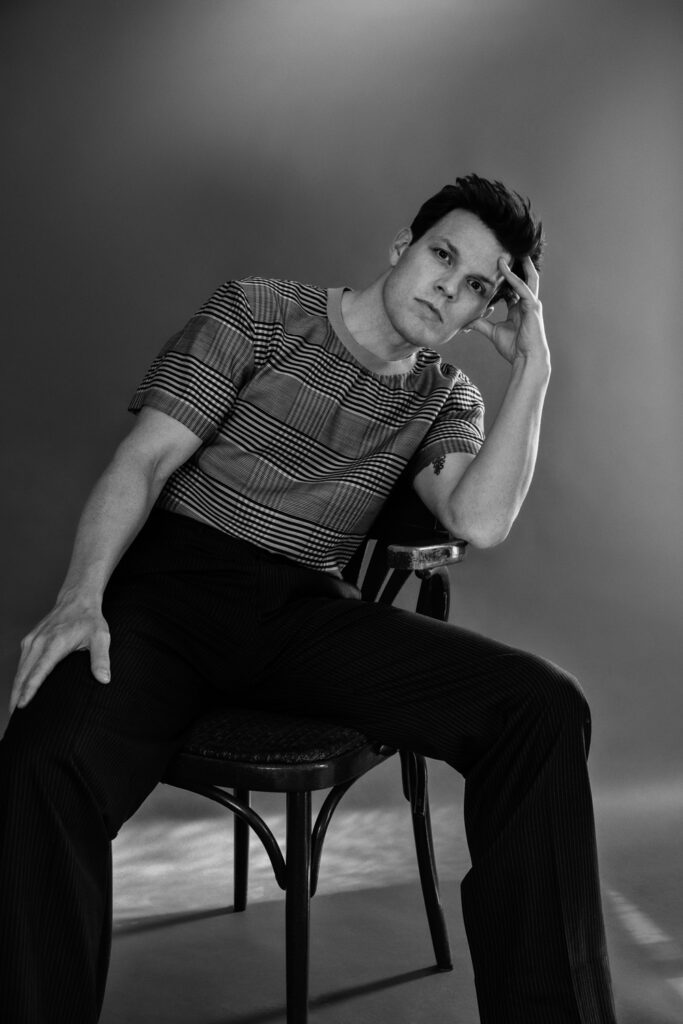
Top: Christian Wijnants, Pants: Salvatore Ferragamo
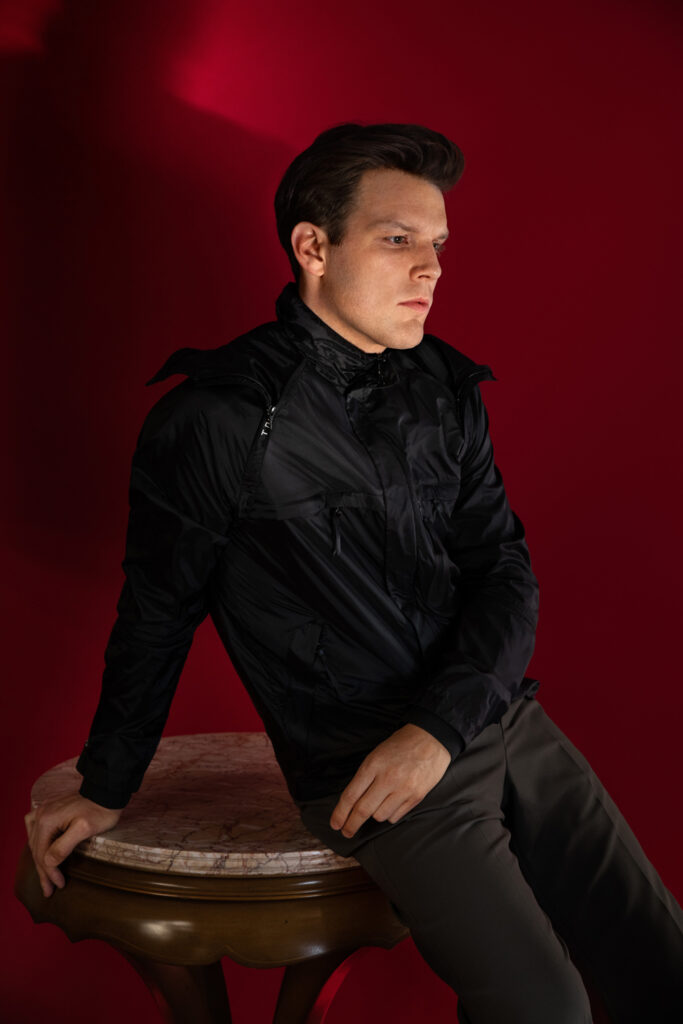
In The White Lotus you play Shane, a financially and socially privileged man, who seems emotionally stunted and obsessive. As this is a social commentary, did your character make you reflect on yourself or your position in society in any way?
I find that most personal growth affects how I view my work or a role, but it rarely goes the other way. I rarely work on something and see direct growth in my personal life because of it. I will say Mike [White] suggested that I be reading Blink by Malcolm Gladwell and I thought, “What a great choice! I love that book!” Mike said something like, “You know, I think Shane thinks this is like, a great smart-person book! Hahaha!” And I thought, “Oh shit. I may be out of my depth here.” It’s those moments that I think, “Am I more like this person than I may ever know?” Then the paranoia sets in.
What was it like playing a character who embodies much of what the satire seeks to critique?
It was a joy. I think Shane thinks he’s a good guy. He thinks he’s unequivocally in the right. And as such, he has the right to stand by his perspective no matter the consequences. He’s just sticking to his guns, but he doesn’t have a lot of grace about him. There’s a lot of ego there. A lot of neediness. Those are all things I worry I suffer from- ego, self-pity, a general lack of gratitude. So, I got to pump all of those into Shane, unchecked. There was definitely some joy in letting those traits hang out, shamelessly.
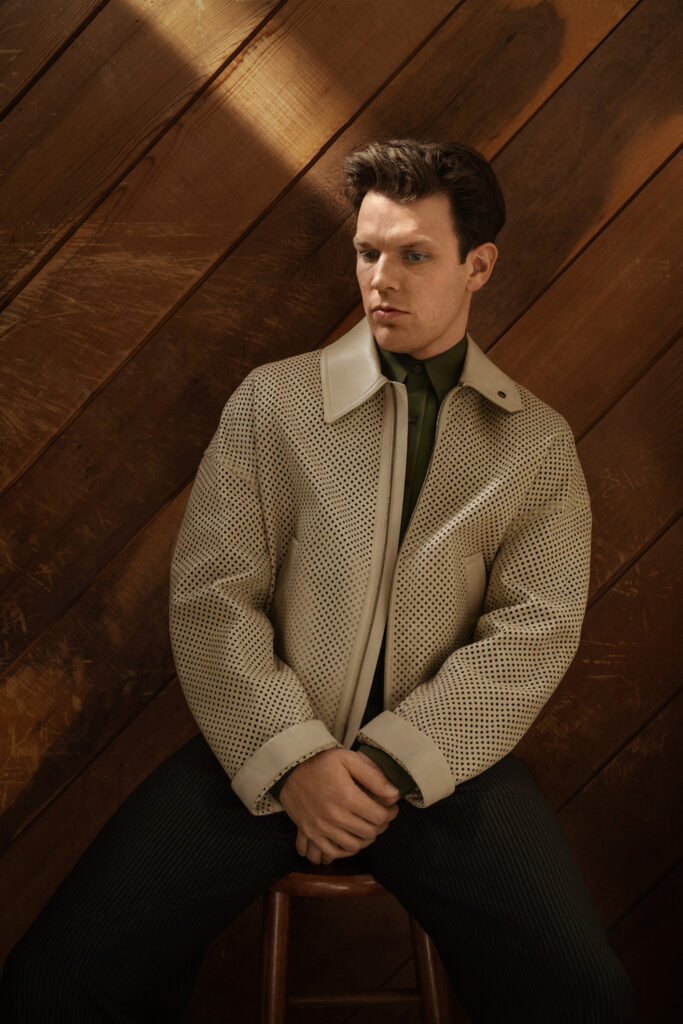
Jacket, Shirt, Belt and Pants: Salvatore Ferragamo
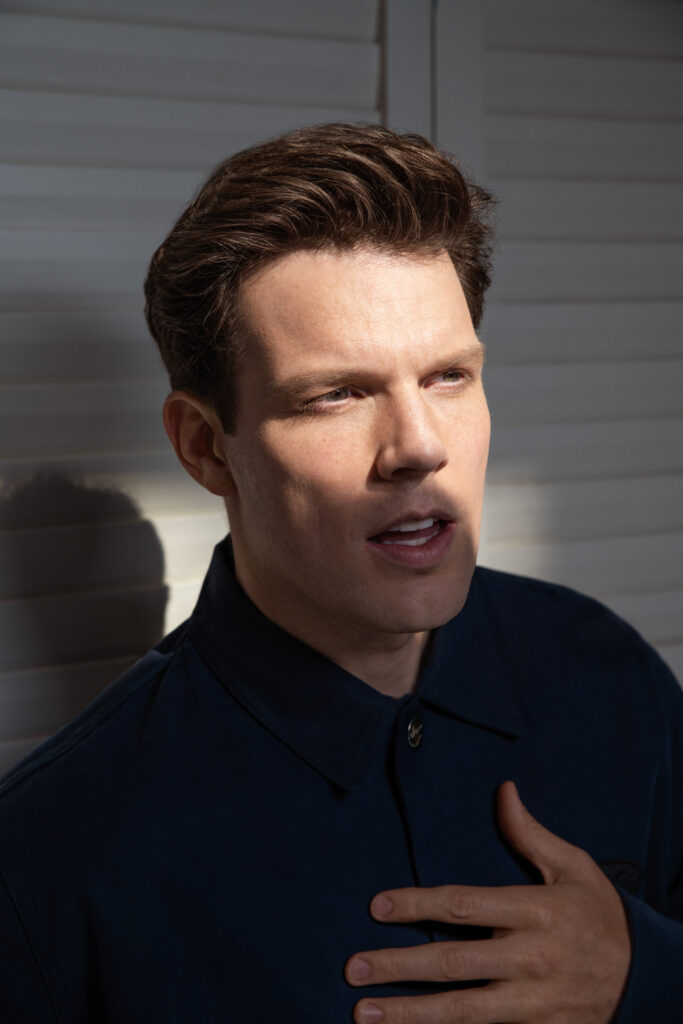
Were there any improv scenes or lines while filming?
I forget if Mike [White] suggested it or if Molly [Shannon] came up with it but she did this wonderful thing during a dinner scene. She’s talking about her charity work and with this big smile says, “It’s all about the monneeeeyyy!!” and starts rubbing her fingers together. I joined in going, “Money money money!!” While Alex [Daddario] just stares at us. They left that in and it made me very happy.
Without giving too much away, were there any scenes that made it difficult to stay in character?
Well, Jennifer [Coolidge] on the boat was a difficult day to get through. Mike had written this really funny eulogy/breakdown for Jennifer’s character. Jennifer used that as a jumping off point to describe how awful her mother had been to her. I could hold it together for the first 5 minutes, but she would inevitably come up with something that was just too much for me and I’d break and have to look out to sea so as not to ruin the take. Jennifer is the MVP.
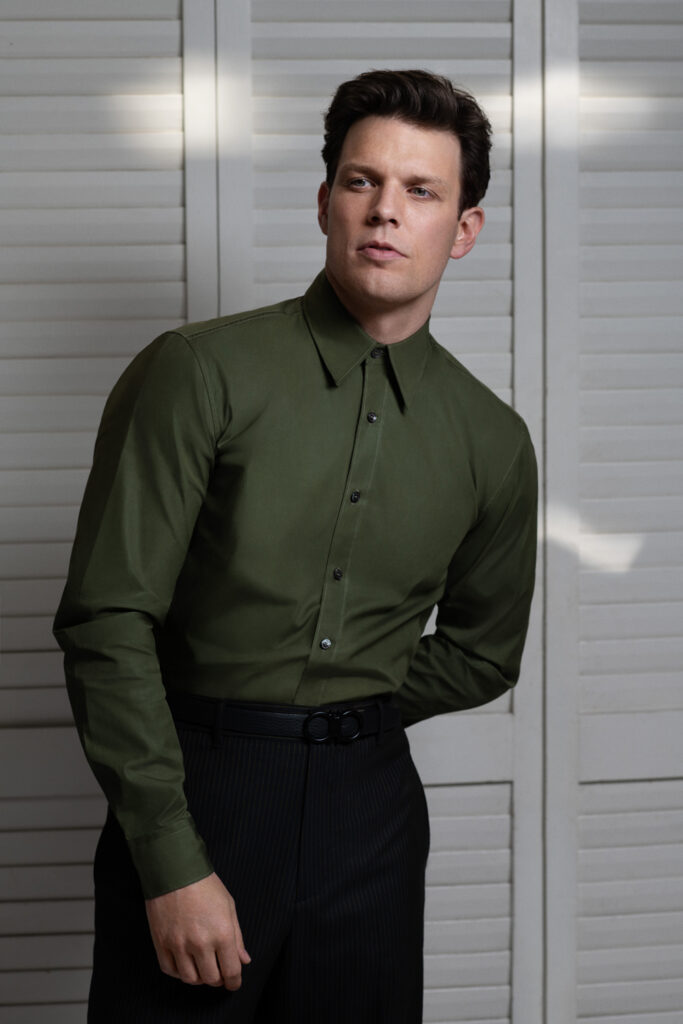
Shirt, Belt and Pants: Salvatore Ferragamo
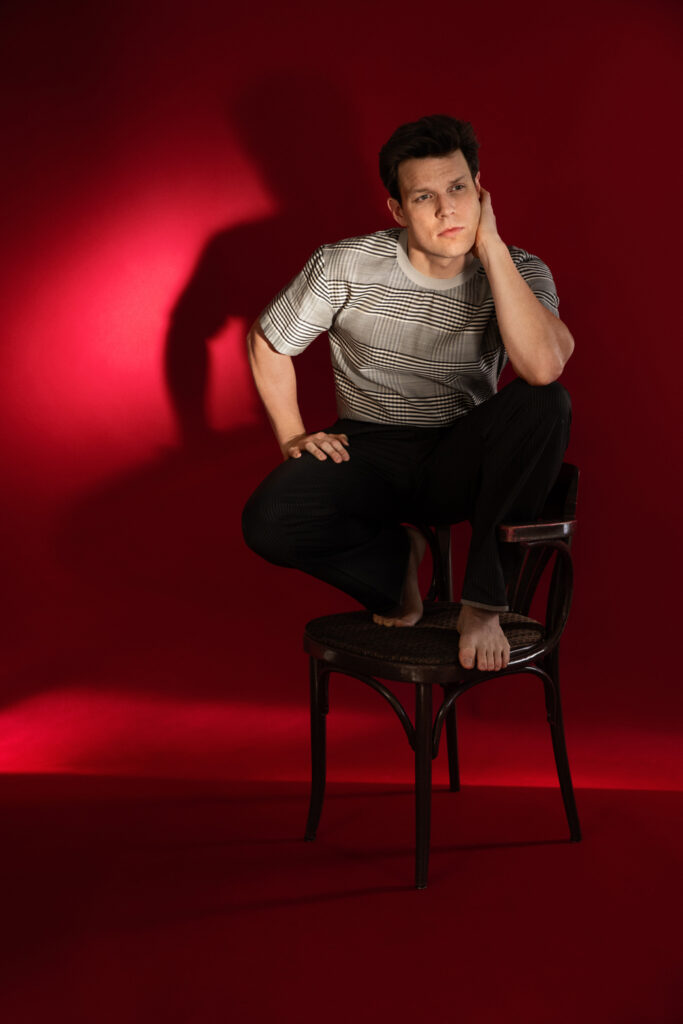
Top: Christian Wijnants, Pants: Salvatore Ferragamo
You have experience in an ensemble cast, notably on the final season of The Office as Pete Miller. The White Lotus also follows an ensemble cast with Alexandra Daddario and yourself playing the honeymoon couple. The TV portrayal shows the characters being in their own silos crossing paths once in a while. As you filmed during the pandemic, were these silos or “social bubbles” a reality?
The cast and crew were the only people staying at the hotel for the majority of filming. We weren’t allowed to leave the property and there was one restaurant partially open. So, we ate together almost every night. I loved it. Steve [Zahn] and Fred [Hechinger] and I ate dinner together almost every night for two and a half months. This cast is a wonderful group of people. It’s pretty rare to not have one shitty apple in the bunch. I just loved it.
Hawaii often represents a tropical utopia and is the perfect contrasting background for the implied social commentaries of The White Lotus. In a life imitating art moment, you were facing the effects of an awful pandemic while filming in this paradise. How did your experience differ from your past filming experiences?
It was surreal. The actual filming experience wasn’t that different from any other set. There were social distancing requirements and actors were masked up between takes. So, that was obviously new. The poor crew had masks and face shields on all day on set. They worked their asses off! One stressful part, aside from the realities of the pandemic itself, was that we had to wrap production just before Christmas. The protocol in place for a positive test was to quarantine everyone who had come in contact with the person who tested positive. Since we were all filming together, if anyone in the cast tested positive (including a false positive) we might not be able to shoot anything for 10 days because we would all be locked in our rooms, which would destroy our schedule. It got a little dicey a couple of times but thankfully it all worked out.
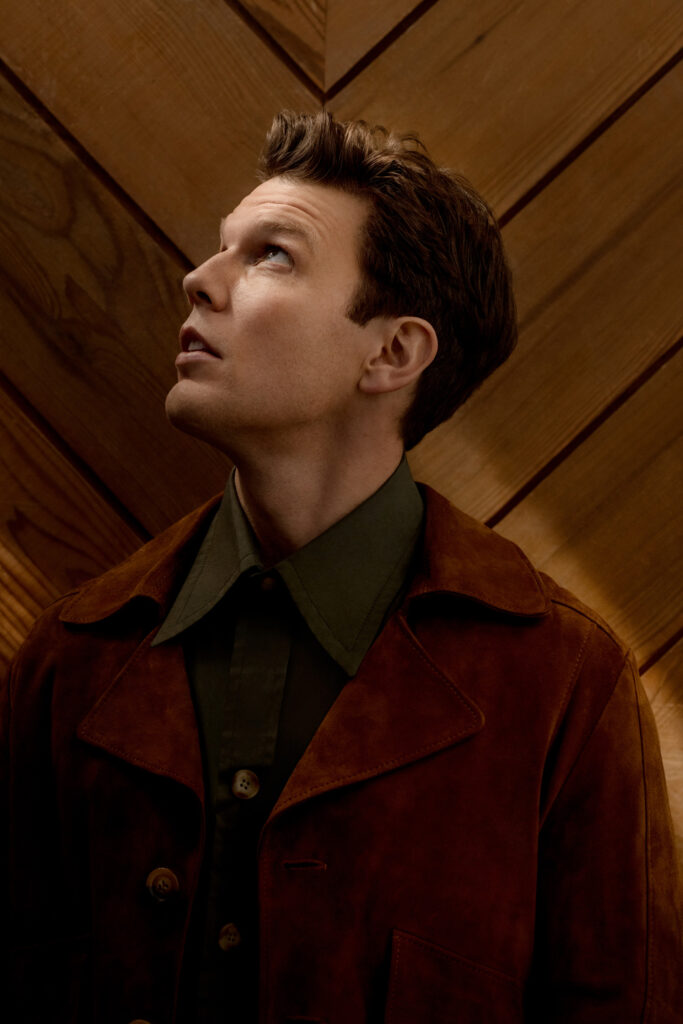
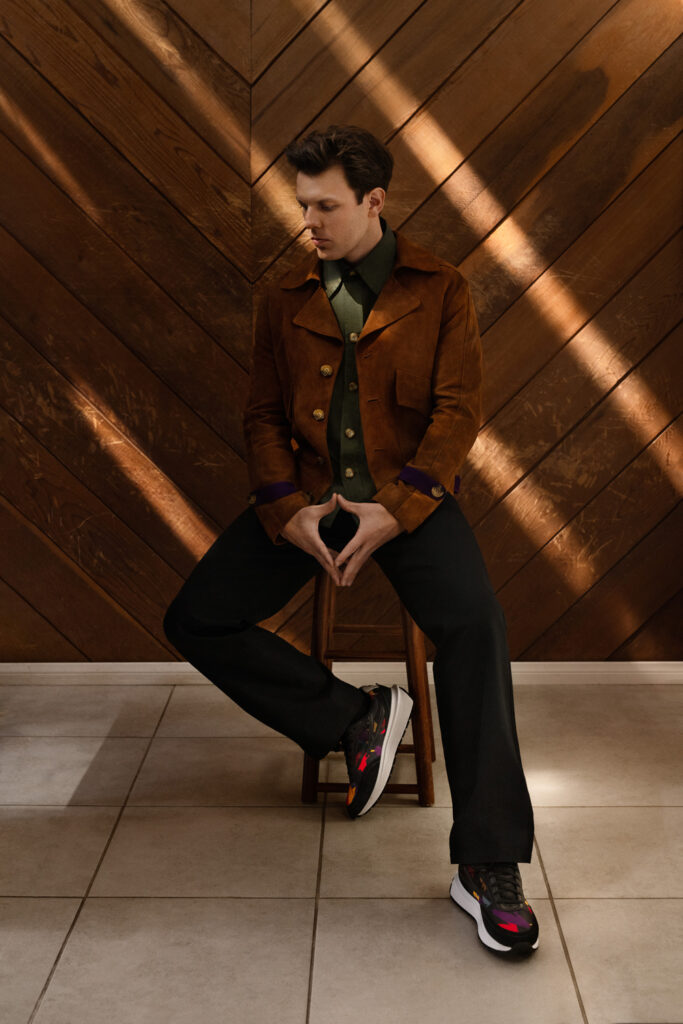
Jacket, Shirt, Belt and Pants: Salvatore Ferragamo, Sneakers: FILA
The series begins with a sinister reveal, so the audience is left waiting for the details surrounding this initial plot point. Were the actors made aware of what was to come or were they left to wonder along with the audience?
Before landing in Hawaii, I had only gotten the first script. So I thought I knew what was what until I got to my hotel room. We each had to quarantine in our hotel room upon arrival for 4 or 5 days which was ample time to dig into the rest of the scripts. Obviously, that’s when I was brought up to speed.
We know you have recently worked on filming Being the Ricardos and you are playing Bob Caroll Jr., American television writer. Is there anything you could tell us about what we should look forward to from this release and what we should expect from you in the future?
Being the Ricardos is such a wild story. Lucille Ball (Nicole Kidman) was accused of being a communist in the same week the tabloids accused Desi (Javier Bardem) of sleeping with call girls. On top of that, they had to go to CBS and convince them to show a pregnant Lucille Ball on television, something no network had ever done. The writing staff for I Love Lucy is played by myself, Alia Shawkat, Tony Hale, and Baize Buzan. Aaron Sorkin wrote and directed it. I mean, I know that sounds like a press write up, but I don’t know what to say. It was another group of wonderful people getting to work on incredible material. I have been very, VERY lucky.
Photography
Dylan Coulter
Fashion Editor
Deborah Ferguson
Interview
Tessa Swantek
Grooming
Barbara Guillaume @ Forward Artists
Using Retrouve Face Serum
Web Layout
Victoria Smith
Thank you
Lede Company & HBO
